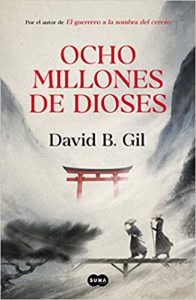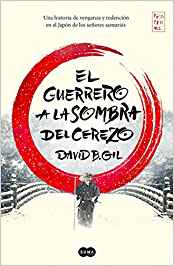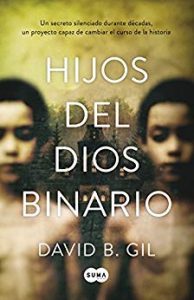I have always said that tanning in the genres of science fiction or fantasy can serve to carve that wood of a good writer of which he already gives a good account David B Gil. Although it is not that in the case of this Cádiz-born author he devoted himself for a long time (not at least in terms of his published works), to fictionalize many plots in that incalculable projection offered by the CiFi.
Be that as it may, the truth is that the case of the leap from the fantastic to the historical fiction bestseller has been seen in other great authors such as David. We could talk about Javier Negrete and some others who shared that blank before the jump to mass literature.
Although what most links this author generationally is those beginnings from desktop publishing that ends up elevating the most recognized by the reading public faced with books without restrictions or large Marketing operations. David must be joined by the cases of Javier Castillo, Eva Garcia Saenz o Eloy Moreno as great emblems of this arrival to success from desktop publishing.
But returning to the tangential harmony between Gil and Negrete, in both cases their evolution was worth it to finally be able to taste works that range from the ancient world of our West to great fictions located in the Japanese empire of the warlike samurai, to cite settings of the most referred to by either of the two authors… Focusing again on David B. Gil, in his thriving literary career, betting on the opening of their books translates into that reading of full enjoyment.
The author's pen knows how to guide you through fascinating scenarios from psychological profiles overflowing with that necessary certain humanity, credible in its contradictions. All of this in a neat exercise of documentation conveyed with that efficiency of a good narrator who brushes without elaborating on the description. A wonderful invitation for the imagination to spread with that passion and tension of the most vivid stories.
Top 3 recommended novels by David B. Gil
Eight million gods
It is curious that the person who best immerses us in fascinating scenarios of Japanese history is David B Gil. Great current Japanese writers like Murakami o Kenzaburo Oe They achieve a very special literary mix. And yet, it is David who ends up raiding bookstores with historical fiction about that world apart from the Far East.
A world ruled even by a different composition in its division of time. The eras associated with the designs of their emperors are still official. In fact, since May 1, 2019 we are in the It was Reiwa since Akihito's abdication in Naruhito.If all this seems very far from our reality, it is easy to understand that back in the XNUMXth century a trip to Japan could be considered as a transition to another world. And in that magical duality in the same world, David B. Gil extracts narrative oil to present us with one more great work in an already anthological saga in the historical genre.
Cual William of Baskerville in "The name of the rivera” Father Martín Ayala addresses a singular case that at first appears as a kind of Shinto countercrusade that aims to eradicate the plague of preachers of Christianity (the Catholic priests displaced there appear dead under an undoubted criminal connection even in its sinister theatricality)Martín Ayala is the one chosen to travel to the other end of the known eastern world (In 1579, the year in which the story begins, in Europe the existence of Oceania was not yet known), and he is the one chosen because a decade ago he was the Martín who participated in the evangelizing mission of those lands, with unfortunate memory since in his mimicry with the culture and the people he ended up establishing inappropriate relationships that forced his expulsion from the mission.
Now, that knowledge seems essential to unravel the ultimate truth of the thorny matter. His protection is entrusted to Kudo Kenjiro, a young expert in martial arts and aspiring samurai who is suspicious of his mission and the advisability of offering defense to a foreigner. Between the two, that synergy of found characters is awakened, of opposite poles that little by little come closer in the natural magnetism of difference.
Everything that has been happening since then is breaking apart between Martín's stormy past in its moral aspect, on the one hand, and the evolution of an investigation that, in the middle of a country convalescing from recent war episodes between feudal lords and the army, points to close ties with a will of ambition and power that can change history.
The warrior in the shade of the cherry tree
Another of those round plots in form and substance that demonstrate the virtues of the achieved craft, the refined style and the ability, in short, to bring us a story distant in time and space with the forcefulness of that humanity that overflows from the intrastories of the human development, here or in XNUMXth century Japan. Precisely in that XNUMXth century, feudalism continued to be the form of organization of an empire driven by strict guidelines, rigid estates but filled with fascinating characters such as the Ronin, masterless samurai who sought new lords under whose protection he will continue with his vital plan.
The truth is that the plot moves in the last years of the XNUMXth century to open us to a scenery of a certain stillness between wars where characters such as Seizo Ikeda or Ekei Inafune guide us through a setting between clans yearning for new disputes for power.The imbalance between human ambition and a fair and strict mentality, typical of the bushido that governed the samurai, moves us through an action full of adventures in search of justice and compensation.
The Japan of those days, devastated by endless wars and closed in a kind of sinister beauty compared to the rest of the world, begins to compose a plot as intense as the sensation of those pinkish cherry blossoms, between the white of their purity and the red of the spilled blood.Children of the binary god
As I always say, science fiction is often an excuse to write a heartbreakingly human story. Stripped of the various conditions of our reality, the imagination always throws itself into an open grave, on any novel proposal in which everything must be reconsidered, principles, beliefs, ideas, opinions and emotions. Handling a good science fiction story with enough hooks to win over any reader is always a great success. And this novel is one of the recent examples of the value of CiFi to address the moral, social and even political.
Without a doubt, it is a futuristic suspense story in which the characters live having comfortably overcome the remote condition of analog versus digital. And yet, the cyclical idea of authenticity makes many think that the past contains much more humanity than the days referred to in the plot.Through Daniel Adelbert and Alicia Lagos, each of them arriving from their place in the world, their traced parallel paths will converge towards an investigation that can change everything, a sinister secret that connects with the most controversial aspects of our human condition.
Other interesting works by David B. Gil
forged in the storm
Asaemon Hikura, master tracker of the Sugawara clan, is called in to investigate the disappearance of five women in a village far from the capital. The locals blame the misfortune on a supernatural creature that, they say, inhabits the mountain, but Asaemon knows well that there is no crueler demon than the one that lives among us. Accompanied by Yumiko, a young local hunter who will serve as his guide and confidant, the samurai will embark on a desperate search.
In the same region, Nanami, daughter of a stonesmith katana, she tries to hide her affair with the young samurai who runs her village. A relationship that contravenes the law and the will of her parents. When war knocks at the door, she Nanami is forced to choose between her loyalty to her family and the person she knows she is bound to by karma. Her decision will have an unexpected influence on the fate of the five missing young women.
A police story with an unusual setting, framed in a rural Japan of suggestive landscapes and dark secrets, by the author who has made the samurai epic fashionable in the Spanish historical novel.
shokunin
For the most fans, it is always a pleasure to enjoy this kind of sequel or derivative of the great novel "The warrior in the shadow of the cherry tree". Without a doubt, this story takes advantage of the pull and power of the main character Ekei Inafune to relocate him in a different plot, prior to the great narration of the novel from which Ekei is extracted.
In his capacity as a doctor, Ekei knew of a kind of plague of guilt, a series of deaths of various clients in the Sabae pleasure district, where men were seeking venting and liberation of consciousness.
In the brevity of the story we find a taste to the point of Conan Doyle and his cases from the English countryside. And the truth is that the intrigue and the surprising ending end up rounding out the work.






1 comment on “The 3 best books by David B. Gil”